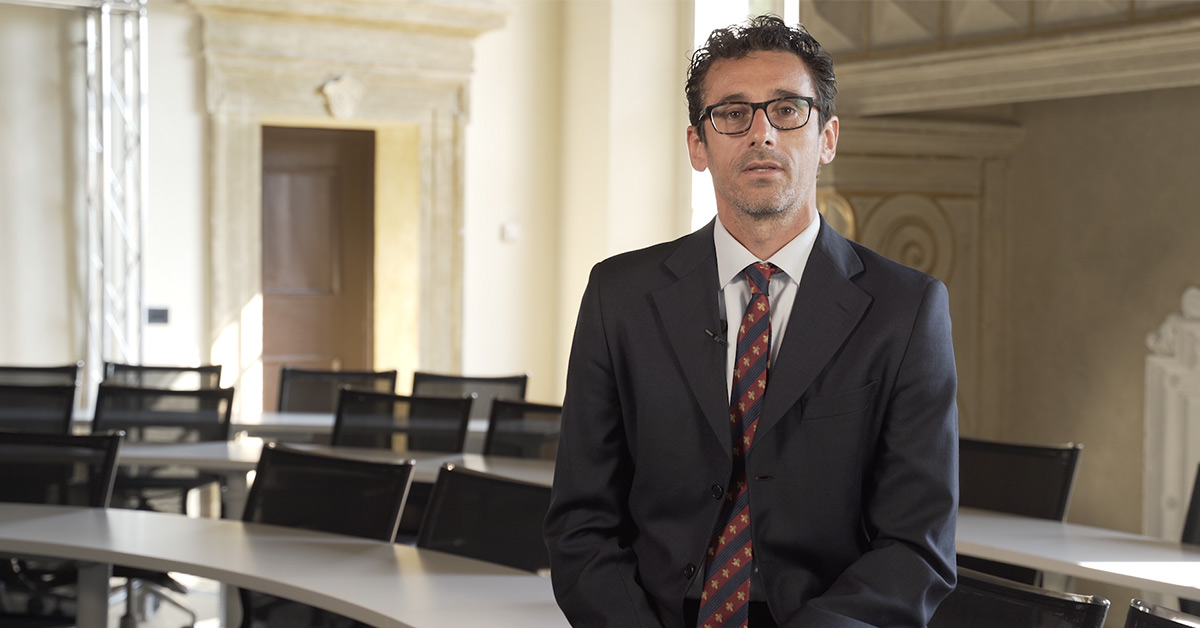
Master Executive Weekend – an interview with Andrea Cinti Luciani
28 April 2023Andrea Cinti Luciani at Bologna Business School he is Adjunct Professor of Business and Corporate Strategy and Executive Director of the MBA – Weekend Formula program.
He has a degree in Economics, an MBA (best student of the year) at Alma Mater and a Master in Finance at University College Dublin.
In today’s complicated and challenging business world, why choose to do an MBA?
Precisely because times are tough. If, until recently, playing it by ear in the corporate world was reasonable to ensure survival, this is no longer the case: not having evolved tools in a world exposed to unpredictable shocks where everything is fast-moving means not having control over one’s activities. Reading this context requires tools that, today more than ever, only higher education can provide.
How does an MBA allow technical skills to be combined with soft skills? What kind of skills are developed?
Let’s start with the programs, which are highly structured, and technical but with a cross-cutting attitude. A good manager has to come out of an MBA with a complete view of the company and of the ecosystem around it to be efficient and competitive.
The Faculty balanced between academics and teachers who come from the professional world makes it possible to offer an educational model with many case studies, sharing of work experiences, and direct contact with business issues.
I like to say that a Master’s program of this level is an “evolved hardware store”: we are able to offer those tools that a good manager must have in his or her “toolbox”. Managerial skills, of course; but also the ability to understand and imagine new scenarios and technical-practical skills to manage the ever-changing business world.
Leadership topic: inborn talent or acquirable through higher education such as an MBA?
We start with the consideration that there is no single kind or style of leadership. A study path such as the one offered by Bologna Business School MBAs brings out how a result can be achieved through different models of leadership, with different approaches.
I believe that leadership is an evolving, continuously under-construction idea: from the acquisition of basic techniques in conflict management to the thinking patterns that neuroscience is able to analyze, leadership is an ongoing process.
A challenging choice for professionals, doing an MBA or a technical master’s degree? What is the way to approach this decision?
In the U.S., we use to say that managers have a “T-shape”, that is, they combine a vertical specialization component (the “I” part of which is the “T”) with a horizontal component of soft and hard skills to cover the more technical knowledge. This is because managers are more complex managers than specialists by aptitude. This is the kind of training we offer with our programs.
Choosing between an MBA and a technical master’s degree? There is no exact answer; it depends on what a person has previously built up and what they aspire to.
I can say that in our MBAs heterogeneity is a highly valued asset and that our faculty is able to offer training that goes in the direction of that “T” which is, to use a visual effect, the “shape” of the good manager.
What are the strengths of the MBA Weekend? What are the core topics?
The strengths are definitely the great pragmatism and tradition: The MBA Weekend formula has existed for 26 years and is ASFOR accredited. We are among the first in the world and the first MBA in Italy with this formula by participant satisfaction, according to the Eduniversal Best Masters Ranking. We offer a good balance of theory and practice for the faculty and the study format, focused on learning through the application of knowledge, facing real cases to learn about best practices directly from professionals who use them in their companies.
The program is very solid and enjoys high overall student satisfaction.
Key themes include the teaching method, which I have already mentioned, aimed mainly at practice and applicable methodologies, and the strong network that is created in 20-24 months of attendance among participants, which is itself a possible incubator of collaborations and new work experiences. Again, the international vocation, is determined by managers and academics who also teach in non-Italian business schools and who bring to BBS a global vision.
